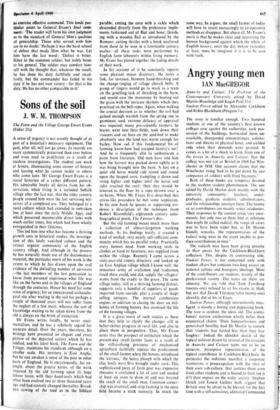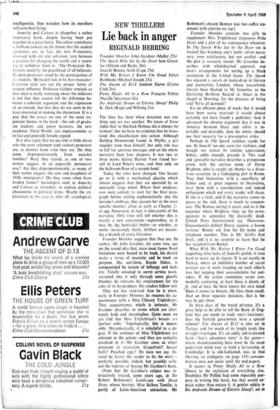Angry young men
IAN MacGREGOR
Student Power edited by Alexander Cockburn and Robin Blackburn (Penguin 7s)
The story is familiar enough. Two hundred students at one of the country's best known colleges rose against the authorities, took pos- session of the buildings, barricaded them un- assailably, disregarded remonstrances, solicita- tions and threats of physical force, and yielded only when their demands were granted. It comes as a bit of a shock to learn, from one of the essays in Anarchy and Culture, that the college was not LSE or Bristol in 1968 but Win- chester in 1818. One account claims that the Winchester rising 'had to be put down by two companies of soldiers with fixed bayonets.'
Both of these, books are symposia devoted to .;he modern student phenomenon. The one edited by David Martin deals mainly with the university community : teachers, under- graduates, graduate students, administrators, and the relationships amongst them. The twenty or so contributors are mainly senior academics. Their responses to the current crisis vary enor- mously, but only two or three hint at solutions that might be called radical; the range of views was to have been wider but, as Dr Martin blandly remarks, 'the representatives of the radical wing were in the event unable to pro- duce contributions in time.'
The radicals may have been giving priority to tbeir pieces for the Cockburn-Blackburn collection. This, despite its constricting title, Student Power, is not concerned only with student affairs but contains two long essays-on national culture, and bourgeois ideology. Most of the contributors are students, mainly of •the professional variety. The notes on them are amusing. We are told that Tom Fawthorp (twenty-one) refused to sit his exams at Hull, but not that David Triesman (also twenty-one) slavishly did sit his at Essex.
Student Power, although intermittently ink:. ligent, is mostly a boring and depressing book. The tone is strident, the ideas old. The contri- butors' narrow exclusivism wholly belies their ecumenical claims. Their humourlessness and generalised hostility lead Dr Martin to remark that 'students fear hatred less than they fear laughter.' Indeed the identikit sketch of the typical militant drawn by several of the essayists in Anarchy and Culture turns out to be an accurate, perceptive representation of the typical contributor to Cockburn-Blackburn. In particular the militants manifest a corporate narcissism, a preoccupation with the rites of their own sub-culture, that isolates them even from other students and is bound to limit (or is it?) their impact on the wider society. Stephen Hatch and Ernest Gellner both suggest that Britain may be about to be blessed for the first time with a self-conscious, alienated Continental intelligentsia. One wonders how its members will earn their living.
Anarchy and Culture is altogether a rather impressive book, despite having been put together in a great hurry. The editor contributes a brilliant conceit on the theme that the student protesters are, in fact, the new Protestants, obsessed with sin and salvation, torn between a passion for changing the world and a yearn- ing to withdraw from it: 'The Protestant Re- formers stood by the priesthood of all believers. Modern protesters stand by the participation of :CI students.' Bernard Crick in his best muscular- Christian style sets out the proper limits of student influence. Professor Gellner reminds us that what is really worrying about the militants is not that they cannot tell the difference be- tween a coherent argument and the expression of an attitude, but that they do not seem in the least interested in making the distinction. It is a pity that the essays on one of the most im- portant themes in the book—the role of gradu- ate students and junior lecturers, the new academic Third World—are impressionistic as to fact and generally loosely argued.
It is also a pity that we are told so little about who the most vehement (and violent) protesters are, as distinct from what they are. Do they come disproportionately from socialist families? Were they reared, as one or two writers suggest, in an especially permissive way? Are they disproportionately, as many of their names suggest, the sons and daughters of 1930s immigrants? Do they come often from broken homes? Sociologists tend, in Anarchy and Culture as elsewhere, to explain political phenomena in political terms. Maybe the ex- planation in this case is, after all, sociological.



































 Previous page
Previous page